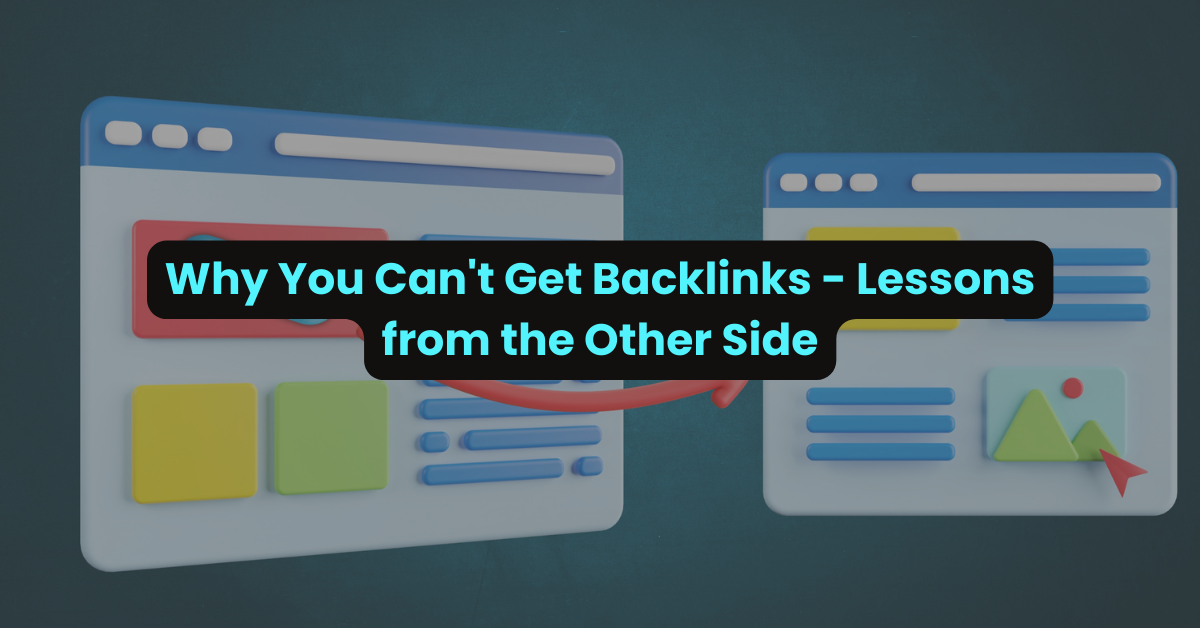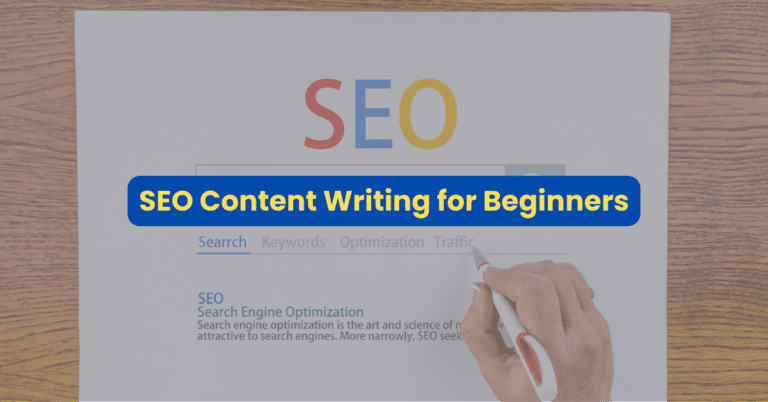I have a modest blog and website. And it’s taken me over a year of work and thousands of dollars for it to grow as little as it has.
Part of making it grow was getting backlinks, and I’ve always found the backlink-building process very painful.
I hate it even. However, I managed to get enough backlinks to build a modest domain rating (DR) of 28-29.
And so, I’ve reached a point where people and agencies want backlinks from me to grow sites that have lower DRs.
So, as someone getting guest posting and backlinking requests, I have a whole other perspective unavailable to me before.
And that’s why I’m making this post on why you can’t get backlinks and what you’re doing wrong. And what I did wrong, too.
Backed with real email screenshots of guest post requests, here are all the things you shouldn’t do if you want a backlink from a respectable website.
Why Websites Aren’t Receptive to Most Guest Post Requests
Let’s start with why giving backlinks to other sites is such a big deal. And, by extension, why it’s so hard to get your post live on a site with your links intact.
To begin, building a successful, traffic-earning blog or website is incredibly hard work.
There are hundreds of hours that go into doing research, writing posts, editing, adding images, and managing the website.
You have to pay for hosting and plugins. And you spend hundreds or thousands of dollars and all without any clear source of income for years, perhaps.
And on top of that, Google is an ever-present entity to be wary of. You see your traffic tank or rise based on its algorithm changes. And you have to worry about creating red flags that result in penalties.
One thing you never want to do to your website is to link to poor content and poor sites. And you never want to get links from poor sites, either.
If I link to irrelevant and poor-quality content, I’m marked as a linking machine rather than a source of good information.
After all the hard work I put in, the last thing I want is to link to another website that’s doing the bare minimum just because it offered me a guest post.
Successful blogs and websites are powerful assets that their owners can’t take for granted. Getting them to where they are cost too much to link to just anyone. And especially to someone who’s coming from a low-effort standpoint.
Start by truly understanding how important a website is to its owner and respect that. Coming from this perspective will change everything.
Real Examples of People Who Won’t Get Backlinks
Now, for the fun part.
Here are emails that I get from people asking for the chance to write a guest post and get a backlink. And with each one, I’ll explain why I won’t work with them. Hopefully, this gives you some perspective.
1. Making a Guest Post Seem Like a Favor
There’s more than one thing wrong with the image above.
The first thing is that two ‘people’ are making guest post requests with the exact same content. It gives the impression that it’s a party that is spamming for links rather than working towards a real collaboration.
But the second thing is that it comes across as doing me a favor rather than the opposite: this person needs something from me.
I also got an email where the writer said they’d give me a guest post I never asked for FOR FREE!
It’s very salesy and spammy and sometimes condescending. Most bloggers aren’t even going to open this email.
Lesson? Don’t spam a site, and don’t make it seem like you’re doing the site a favor. Guest posts are a dime a dozen and aren’t as powerful as they used to be.
2. Poorly Crafted Messages
If an outreach email has grammatical errors, bad punctuation, and basic language issues, then there’s no reason to expect the actual guest post to be any good.
Check that your email is as perfect as possible when it comes to grammar. Minor mistakes are forgivable, but so many in one email aren’t.
3. Non-Existent or Low-Quality Blog Content
Many link builders ask to link to home pages, product reviews with affiliate links, and pricing pages.
But most guest posting sites only accept links to informative blog posts, and they will not link to anything else. I will almost never link to anything else on my site. The rare exception is when I get a great benefit for linking to a home page or product age.
So, when you do outreach, ensure you have top-quality blog posts that other sites will be happy to link to.
I cannot take any outreach seriously where they have three or four low-effort blog posts generated with ChatGPT.
My own blog posts take hours of research and drafting. I use special tools for which I pay over $100 monthly to support my content creation. Why would I ever link to something that doesn’t care about quality as much as I do?
I would never, of course. And neither will the big sites that you want links from.
4. Poorly Designed New Sites
Another reason why I won’t link to someone else is if their website is brand new and looks awful.
User experience directly impacts rankings. That is, your site design, navigation, and loading time will affect whether people stay on your website and whether this site ranks for relevant keywords.
So, having a nicely designed website helps, and one that looks spammy and loads slowly does not.
So, make an extra effort to use a good theme or even work with a designer to make your site look good. I use Kadence Blocks for free on my site, and you should use the something similar to make your site look and feel better. And blog owners will feel happier about linking to your content.
5. Not Being Upfront About Details
I’ve learned something from receiving dozens of guest posting requests: more details are better than too few.
I’d like to know what the whole scene is about before I respond – especially since many people ask for linking opportunities.
This means including in your email:
- Your proposition: you want to write a guest post, and you’d like to link to x number of posts/sites. You want to do a guest post exchange or offer some other benefit.
- What your site is about. Who you are. What’s your purpose? (But keep it brief)
- Some guest post topic ideas. The more relevant they are to my site, the better. Even more helpful is if you can fill a gap in my blog.
- Samples of your previous writing so I know what to expect regarding quality.
And so on. If you have value to offer, you won’t be afraid to be upfront about it.
I hate having to go back and forth, asking what topics outreach specialists have in mind, what site they want to link to, how many links, and so on.
6. Not Having a Business Email
Guest posting and backlink building work best when viewed as a business collaboration.
That’s why my email address includes the name of my website. I’m very upfront about who I am and that I have a blog where I write content.
Outreach emails from generic Gmail addresses with a name that may not be real or may not represent a legitimate business don’t inspire confidence.
So, blog owners are less likely to take outreach emails from Gmail addresses or personal accounts seriously.
If you run a serious business and provide value, you will invest in a business email. And while generic, personal email addresses can get through, it’s more work.
7. Offering Money
For many bloggers, getting paid to add guest posts to a site is a valid and great way to run a business and make money.
And no question, I’d do it too if it made sense for my brand.
But you should avoid offering money for links directly, even if it is the norm in your experience.
When I get an email that dives into offering money, I ignore it because:
a) It assumes that I’ll just post anything on my site as long as I get paid.
b) I’ll accept any level of content quality as long as I get money.
Blogs and websites that take their work seriously (and that’s why they have high DRs, you know) reject anything that falls short of excellence.
And money can’t buy that. So, avoid offering any cash for links directly and focus on earning them instead. Or try to collaborate in earnest.
You’ll do much better than if you made a cheap and bold attempt to buy your links.
8. Being Critical of Existing Content
No one wants to hear that their work is poor.
Especially the person you want to get a link from.
Take the above image, for example.
Let’s gloss over the salutation that simply refers to me as ‘Dmdutta Owner’ (when my name is clearly visible on my website).
Here, the link builder syas that an existing block post misses key points. However, they do not specify what these key points are briefly. Nor do they provide any information that makes me believe they can improve my content. Some samples or a reference site would help.
Tread lightly if you are going to criticize or offer to improve an existing post. I have heard marketing gurus recommend this approach, but it has never made sense to me.
If I were to use this means of asking for a backlink, I’d do it this way:
Hey Firstname,
I’m Deb, a content marketing enthusiast, and I loved your post on ‘X Tips to Launch Your Marketing Agency’. I especially loved the tip on partnering with other agencies.
I had an insight that you might find helpful: What if marketing agencies contracted remote writers to reach more people? I’d love to support your post by adding a few points if you like.
What do you think? I’d love to update your post for 2023 and add a link to a helpful post on my blog on hiring remote workers. Let me know what you think.
Best,
Deb
It’s far better to be respectful and appreciative than to imply that someone’s content needs to be better.
9. Personalization… Who’s That?
The screenshot in the previous section is a good example of personalization… done wrong.
In most cases, outreach specialists don’t tailor their emails to the recipient. They go, ‘Hey, there’ and ‘I’d like to contribute a blog post for you.’
And this type of content makes my eyes glaze over.
However, the last thing you want to do is personalize the wrong way, as the person who referred to me as ‘Dmdutta Owner’ did.
Basically, make an effort to get to know a blog, the person behind it, the content, and it’s style, tone, and so on.
And this should help you craft an email that’s more likely to win the blog’s trust.
10. No Face Behind the Email
Many outreach specialists don’t realize that people like to know who they are dealing with.
I find it helpful to know a bit about the person behind the email before I consider responding.
Something as simple as adding your profile image, a full name, work role, and links to your social media and website can make a difference.
The more you make it evident that a real person and business is trying to collaborate, the more likely a website owner will respond.
Take your online presence seriously. Show that you are a real person with legitimate business interests, and you will get more replies.
This outreach specialist has no links and doesn’t even sign off with a signature. Who’s going to take this seriously?
11. Being Vague
This section does restate points made earlier, but it’s still worth talking about –
When you lack personalization, your content and approach are automatically vague.
No business owner will waste their time on a vague pitch from a strange link builder.
This email could not be more vague. No bueno.
State your goals and objectives clearly, and be direct about what you can offer in exchange for a link or guest post.
Be precise about the topics that are relevant to the website or blog, reference any previous collaborations between you and other websites, provide samples of quality content you have written, etc. This won’t make you win every time, but it will open more doors for you.
These are the biggest reasons why your backlink outreach isn’t working. Do you do any of these things?
If so, it’s time to change.
Now, let’s look at cases where I did accept guest posts and linked to some sites because it was a good experience over all.
Real Examples of People Who Get Backlinks
Here’s a case study of how I worked with someone who made an effort to personalize their conversations. They also offered mutually beneficial exchanges and showed that they were real persons with the goal of sharing useful content.
1. Outreach via LinkedIn
It started with an invitation to connect on LinkedIn.
As you can see, they were super conversational, showed interest in my work, and were direct about collaborating. And they also talked about their previous work and gave me a history I could check.
It was so clear that I was dealing with a person with a legitimate business, and I’d never have to regret linking to them.
They also followed up and answered my questions. What went on later were just conversations going back and forth, hammering out the details.
It was this initial conversation that set the stage for us to collaborate, create content, and help each other grow.
2. Email Outreach from a Solid Brand
In this second case study, where I accepted a collaboration to guest post on my site, you’ll see how a brand reached out to me with a legit business email and strategy.
It’s worth noting that while I did not find much information about the person who reached out to me, the brand itself was genuine, had a good domain rating, and had several strong blog posts on its site.
Here’s the email that started it all:
There are so many things that this outreach specialist did right:
- It was pretty personalized – they mentioned me by first name
- They offered value
- They had specific blog topics
- They had a company link I could check
- The link builder used a business email
- The brand had a decent domain rating
- The brand’s blog section had many well-written informative posts
Overall, what struck me was that I was working with a business that invested in its outreach. I wasn’t dealing with a faceless random s0meb0dy@gmail.com.
And they were upfront with what they wanted.
We followed up with several emails managing the details. But it was the first email that launched everything.
The Missing Reason for Your Backlink Building Failure
One thing became evident to me throughout this journey: content marketing matters.
When I approached brands to ask for links to my site, the process was easier because:
- I had high-quality blog posts that supported me and showed that I was a real person who cared about offering value.
- I had many blog pages to link to at the drop of a hat.
- The quality of my blog posts vouched for my professionalism.
Link builders and outreach specialists need to understand the importance of quality content. And how great content increases the chances of getting links.
A content-rich blog with a clear strategy can be the difference that takes a site with a DA/DR of 0 to 50 fast. It’s the key you don’t know you’re missing that will transform your link-building.
The best way to create meaningful content is to build and implement a content strategy.
Also, work with a content strategist to:
- Define your content goals and link them to your overall business strategy
- Identify your audience
- Do keyword research
- Develop a content strategy based on the buyer’s journey or by focusing on keyword clusters.
- Optimize your blog post titles, blog structure, internal linking, and so on.
Want to learn more about building your content? Reach out to me and I’m happy to help.
Make Your Outreach Efforts Count
There’s no question that you need to collaborate with blog owners to drive backlinks to your site. However, you have to be strategic and deliberate about this.
As a blog owner and content marketer, I’ve gained some perspective on what it feels like to be on the receiving end of guest posting requests.
For all the emails I’ve received, I’ve only ever worked with two people to accept guest posts and add links.
This post lays out simple but powerful errors you might be making – change them and you’ll win over more blog owners and be able to submit guest posts and get backlinks in return.
And if you want your blog to get more links, more traffic, and more sales, let me know! I’ll help you build the only content strategy you’ll need.



